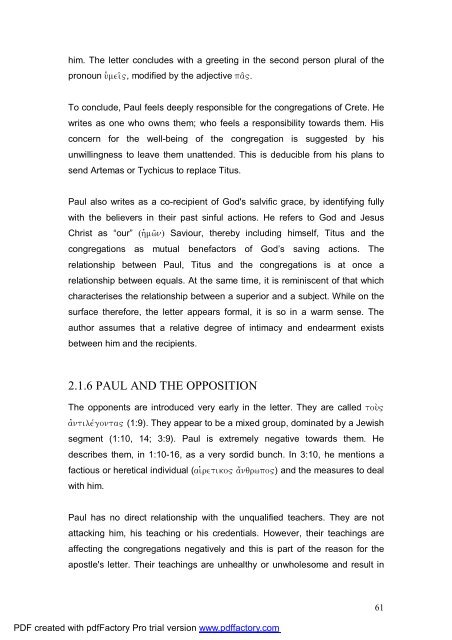A Text centred rhetorical analysis of Paul's Letter to Titus
A Text centred rhetorical analysis of Paul's Letter to Titus
A Text centred rhetorical analysis of Paul's Letter to Titus
You also want an ePaper? Increase the reach of your titles
YUMPU automatically turns print PDFs into web optimized ePapers that Google loves.
him. The letter concludes with a greeting in the second person plural <strong>of</strong> the<br />
pronoun uJmei'", modified by the adjective pa'".<br />
To conclude, Paul feels deeply responsible for the congregations <strong>of</strong> Crete. He<br />
writes as one who owns them; who feels a responsibility <strong>to</strong>wards them. His<br />
concern for the well-being <strong>of</strong> the congregation is suggested by his<br />
unwillingness <strong>to</strong> leave them unattended. This is deducible from his plans <strong>to</strong><br />
send Artemas or Tychicus <strong>to</strong> replace <strong>Titus</strong>.<br />
Paul also writes as a co-recipient <strong>of</strong> God's salvific grace, by identifying fully<br />
with the believers in their past sinful actions. He refers <strong>to</strong> God and Jesus<br />
Christ as “our” (hJmw`n) Saviour, thereby including himself, <strong>Titus</strong> and the<br />
congregations as mutual benefac<strong>to</strong>rs <strong>of</strong> God’s saving actions. The<br />
relationship between Paul, <strong>Titus</strong> and the congregations is at once a<br />
relationship between equals. At the same time, it is reminiscent <strong>of</strong> that which<br />
characterises the relationship between a superior and a subject. While on the<br />
surface therefore, the letter appears formal, it is so in a warm sense. The<br />
author assumes that a relative degree <strong>of</strong> intimacy and endearment exists<br />
between him and the recipients.<br />
2.1.6 PAUL AND THE OPPOSITION<br />
The opponents are introduced very early in the letter. They are called <strong>to</strong>u;"<br />
ajntilevgonta" (1:9). They appear <strong>to</strong> be a mixed group, dominated by a Jewish<br />
segment (1:10, 14; 3:9). Paul is extremely negative <strong>to</strong>wards them. He<br />
describes them, in 1:10-16, as a very sordid bunch. In 3:10, he mentions a<br />
factious or heretical individual (aiJretiko" a[nqrwpo") and the measures <strong>to</strong> deal<br />
with him.<br />
Paul has no direct relationship with the unqualified teachers. They are not<br />
attacking him, his teaching or his credentials. However, their teachings are<br />
affecting the congregations negatively and this is part <strong>of</strong> the reason for the<br />
apostle's letter. Their teachings are unhealthy or unwholesome and result in<br />
PDF created with pdfFac<strong>to</strong>ry Pro trial version www.pdffac<strong>to</strong>ry.com<br />
61

















